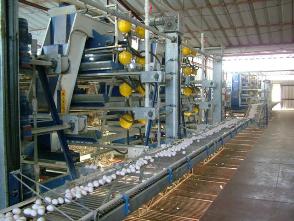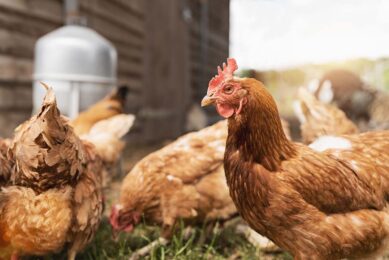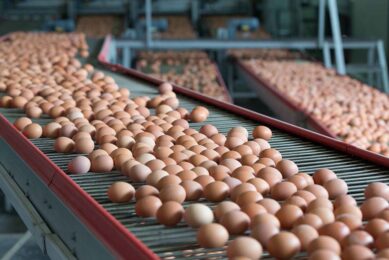“Eggs of today” across Mexico

With a projected annual production of 2.4 million tonnes in 2010, Mexico has become a major producer of table eggs on the world market. Empresas Gaudalupe strongly contributes to that output. Throughout the country they keep 8 million layers, producing for the domestic market.
By Ad Bal
Empresas Gaudalupe was founded over 40 years ago by Don Benajmín Pérez de Anda. Like with all such businesses, it started as a small operation. But over the years it expanded until its current size, that of one of Mexico’s biggest suppliers of table eggs. Empresas Gaudalupe keep no less than 8 million white egg layers. Rearing, egg packing and distribution, feed manufacturing, they have it all in their own hands. They even produce packing materials (egg cartons and boxes) by themselves. This makes Empresas Gaudalupe a major player in Mexico.
Two stage rearing
Unlike in Europe and some parts of the USA, egg production in Mexico is to a large extent still based on caged systems, like at Empresas Gaudalupe. A visit to some of their facilities near Guadalajara in the state of Jalisco, provides a good impression of how they manage their flocks.
Rearing and egg production take place on different premises, but the farms are located near to each other. All chicks are sourced by Hy-Line which is, with a market share of about 60%, dominating the Mexican market. According to Empresas Gaudalupe production manager, Ricardo Aguilar Toscano, Hy-Line white has proven to thrive under Mexican conditions and produce according to the breeders standards. “That’s a good reason to have confidence in the brand.”
The day old chicks need different care and management than pullets in a later stage. For that reason, rearing is done in two stages. From day old to six weeks of age, the chicks are kept in insulated houses, in which the temperature can be controlled. Gas brooders keep them at the desired temperature during the first days of rearing. The chicks are raised in flat deck battery cages in groups, ranging from 68-95 birds per compartment. These cages are all built locally by De Anda, a manufacturer from Jalisco, Mexico. This company also manufactures feeding and drinking systems. The pullets are fed ad libitum, initially on yellow plates at the bottom of the cage and later they have access to the gutters in front of the cages. Beak trimming is done at 8 days of age.
Moving at six weeks
Since the Guadalajara area has a warm climate, the pullets can be moved to open side houses from six weeks of age. Also that’s necessary because the flat deck batteries are not designed for keeping the birds longer. During the second part of rearing, the pullets are kept in two-tier cages, also built by De Anda.
Empresas Gaudalupe keep about 150,000 pullets at this farm: six houses of 25,000 pullets each for the first six weeks and seven houses with just over 22,000 birds for stage two. At 16 weeks of age the birds are moved to the production facilities. “Moving the pullets twice doesn’t cause excess stress”, says Ricardo Aguilar Toscano. “Mortality over the first 20 weeks is less than 2%, which is well within the standards of Hy-Line.”
Old and modern
A major layer operation of Empresas Gaudalupe is also located near to Guadalajara. About 400,000 layers are kept in three different types of houses here. Some are fairly old already and in these houses a considerable amount of manual labour is necessary. Some are more modern including one very new section of the farm with two houses of 50,000 layers each. Again all the birds on this farm are kept in laying cages of De Anda.
The newest houses are built two meters above ground level, enabling the manure to fall underneath the cages that are built in a pyramid construction. This enables easy removal of the manure, as small loader vehicles have easy access. The manure will dry easily because of the high outdoor temperatures.
These houses are equipped with four-tier fully automated cage systems including automatic egg collection systems. The central belt is connected to an on-site grading and packing station. Here the eggs are immediately packed in boxes and distributed to outlets in the Guadalajara region.
From 18 weeks of age, the onset of lay is stimulated by increasing the exposure to light by up to 16 hours per day. The birds start laying at an age of about 20 weeks and will stay productive for a full period of 52 weeks. Currently the eggs are marketed all over Mexico under eight different brand names, among which is the own brand of Empresas Gaudalupe. They are promoting these under the slogan “El huevo de hoy”, meaning “The egg of today”. At least that’s a good way of making clear that an egg belongs on today’s menu. With that message Empresas Gaudalupe projects that they are a strong and professional player on the Mexican market. Indeed there’s no question about that.
See also Ad Bal’s Photo Report “Eggs of today” across Mexico
Join 31,000+ subscribers
Subscribe to our newsletter to stay updated about all the need-to-know content in the poultry sector, three times a week. Beheer
Beheer








 WP Admin
WP Admin  Bewerk bericht
Bewerk bericht